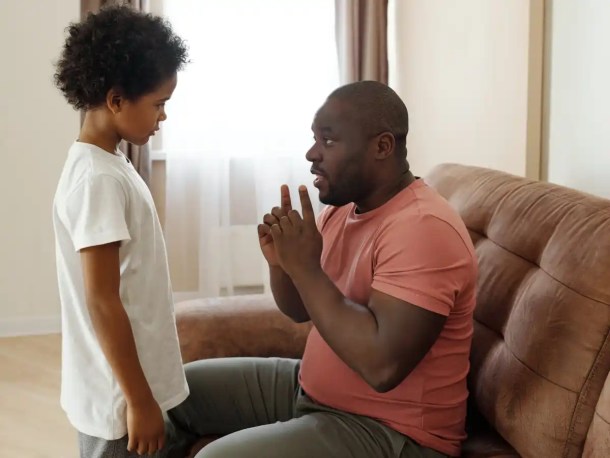By Jnathan | Word In Black
This post was originally published on Michigan Chronicle
Photograph courtesy of August de Richelieu/Pexels.
(WIB) – As a parent, it may be difficult to accept that your children are sexual—and even harder to think of them engaging in behaviors that would put them at risk for diseases like chlamydia or gonorrhea. Below are strategies you can use when talking to your children about sexually transmitted diseases (STDs).
Getting Started
While you may feel uncomfortable discussing sex with your child, it’s too important to ignore or let them figure it out on their own and hope for the best. You can lay the groundwork for this conversation when your child is young, for example, by being open to questions your child may have about their body—or yours. Building an open, trusting relationship when your child is young will make a big difference when sensitive sexual topics arise.
It’s important to remember that sex and STDs don’t have to be a single sit-down talk. Instead, having a brief, meaningful conversations can help your child and give them food for thought in small bites. Also, consider what’s going on in your child’s life. For example, if one of the girls in the neighborhood or a friend at school gets pregnant, it could lead to a talk about contraceptives, STDs, unprotected sex—or a complex topic such as abortion.
If you don’t know much about STDs, you can find reliable facts and information from places such as the Detroit Health Department, your Wellness Plan healthcare provider, or the Centers for Disease Control and Prevention (CDC). Afterward would be an excellent time to discuss what you learned, using words your child can understand. Be sure to get some written material such as a good website or book your child may enjoy reading on their own.
Remember that scared straight tactics don’t help. Trying to frighten your child about the dangers of STDs might make them uncomfortable talking to you about their concerns and turn to their friends or an untrustworthy adult. But it would be best if you worked to correct any misconceptions they may have about how STDs are spread. You may want to share ideas that you used to have about sex and mistakes that you made when you were younger.
Feel free to ask how your child feels about sexual activity. Questions like “Do you think it is okay for a person to have unprotected sex?” may be good starting points to understand your child’s views on sex. This can also lead to a discussion about ways to prevent STDs.
In addition, get advice from family and friends who have raised teens. Their doctor can also be a source of support and encouragement when going through this standard but challenging time in your child’s life.
Supporting Your Child’s Well-Being
In addition to having honest conversations about sex and STDs, you can support your child’s overall well-being by:
Providing good role models—Children can learn from your example and the example of other good role models like older siblings, relatives, and friends.Promoting self-confidence—Praise honesty, independence, talent, effort, responsibility, and good decision-making. This will encourage self-confidence, which can help your children overcome peer pressure and make good decisions about sex.Encouraging positive feelings about sex—People who have positive feelings about sex, their bodies, and masturbation may be more likely to protect themselves from STDs, unintended pregnancy, and sexual abuse. Try to instill these positive feelings in your children.Fostering good decision-making skills—Offer options instead of giving orders. By making choices from an early age, children gain practice in making good decisions.Developing trust—If your children know you will be there for them no matter what, they may be more willing to trust you with information about their sexual activity and ask questions. Try to be patient and reasonable to foster this trusting relationship. Respecting your children’s privacy, personal space, and individuality can also help gain trust.Reassuring your child—Children can feel isolated and depressed through their teen years. Stress that “being different is normal” and that other teens have similar feelings.
Caring for Your Child’s Health
Your child should have regular physical exams where your child’s doctor or physician can help decide on needed tests. Access to confidential healthcare and a doctor they feel comfortable with is very important. Allow them to have private time with the doctor so they can ask questions without your presence.
During the physical exams, your child should get the recommended vaccines for their age group. For example, there is a vaccine to protect against the human papillomavirus (HPV). HPV, one of the most common STDs, causes genital warts, and some strains can lead to cervical and other cancers in both males and females. Hepatitis B is another infection that can spread through sexual activity. This vaccine is often given to newborns, but older children and teens who have not been vaccinated can receive a series of shots.
What to Do If Your Child Has an STD
If your child is diagnosed with an STD:
Ensure your child attends all their follow-up appointments and takes the recommended medications.Encourage your child to tell the doctor if their symptoms worsen or if new symptoms develop, even if they won’t tell you.Note: Sometimes, the symptoms of STDs can be mistaken for other conditions, or the infection may not have any signs. Other times, symptoms may not appear for weeks, making it hard to determine a timeline of events. Symptoms can also arise and disappear quickly, then return much later. When symptoms disappear, it does not mean the STD is gone.Offer your child emotional support. Reassure your child that having an STD does not make them a bad person. Also, your child may want to talk to a therapist about what they are going through.
Your child needs to know that you support them and want them to be healthy. You can help your child make good choices about sex by being available for talks and being ready to listen.
![]()
Related
Discovered on: 2022-08-29 07:01:00
Source: Talking to Your Children About Sexually Transmitted Diseases



